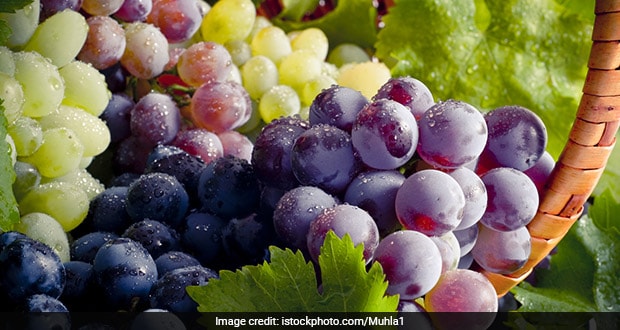Juicy, sweet and delightful grapes are possibly one of the oldest fruit known to mankind. From royal courts to local households, this delicious fruit has been a favourite of all. If you go back to classical paintings and texts, the delicious bunch of grapes were quite a favourite of the Gods too. Occurring in clusters on the deciduous woody vines of the flowering plant genus Vitis, grapes are an extremely versatile fruit. They can be eaten fresh and raw from the bunch, or be used to make wine, jam, juice, jelly, grape seed extract, raisins, vinegar, and grape seed oil etc. Grapes are mostly found in many colours. In terms of the nutritive profile, all of them rank very high across all health charts and are more or less the same. The amount of anthocyanins are more in grapes of darker hues. According to the book, 'Healing Foods' by DK Publishing House, anthocyanins are the most abundant antioxidant in red and black grapes. They have heart protective properties. Black grapes contain Lutein and Zeaxanthin, which are carotenoids, known to help in maintaining good eyesight. On the other hand, flavonoid antioxidants also known as catechins, which are most abundant in white grapes. Grapes are actually 'berries' that have a semi-solid, translucent flesh inside them; grapes are even enjoyed in their dried forms (raisin). Raisins are basically dried white grape, which are beneficial for gut, eye health and energy levels. Grapes are an excellent source of potassium, calcium and vitamin A. These juicy delights are a natural diuretic and packed with healthful antioxidants that could help give you a glowing skin, healthy heart and prevent the free radical damage. Grapes could prove to be excellent brain foods too. Grapes may improve memory and concentration. Due to riboflavin presence, it is beneficial for people suffering from migraines. Resveratrol found in grapes can reduce the levels of amyloidal-beta peptides in Alzheimer's disease patients. Due to its high potassium content, grapes also help maintain the electrolyte balance of the body and flush out excess water and toxins.
According to book 'Healing Foods', grapes may have strong anticancer properties too. The book notes, "The high levels of flavonoids, anthocyanins, stilbenes, and many other antioxidants, especially in dark-skinned grapes, have been found to reduce risk of cancers of the breast and prostate caused by free radical damage. Grape antioxidant dietary fibre also helps lower the risk of colon cancer."(Also Read: 7 Amazing Benefits of Grapes for Health and Skin)

grapes may have strong anticancer properties too
Grapes are also one of the safer picks for diabetics. It ensures slow release of carbohydrates that make sure there are no untimely blood sugar spikes. The fibres present in grapes also assist the regulation further.
In addition to being packed with vitamins, minerals and nutrients, grapes are also decently low in calories, which makes them one of the best bets for effective weight loss.

Calories in grapes:Grapes are also one of the safer picks for diabetics
Calories In Grape
Calorie is a unit of measurement used to indicate the amount of energy released when the body breaks down (digests and absorbs) food. When it releases more calories than needed by the body as energy to sustain, the extra calories get stored as fat. As long as your body is using up all the calories released by the food you eat, you may be able to maintain your weight. Whenever there is an imbalance, you may face weight fluctuations. For all those wondering about the total calories in grapes, you are at the right place. Here's a calorie breakdown of different kind of grapes as per the United States Department of Agriculture.
- Calories in Red grape
There are about 70 calories per hundred grams of red grape
- Calories in Black grape
There are about 70 calories per 100 grams of black grapes.
- Calories in Muscadine grapes
There are about 84.29 calories per 100 grams of Muscadine grapes.
- Calories in Thompson seedless grapes (red and green)
There are about 69-71 calories in 100 grams of Thompson grapes
Calories In Grape: How to Use The Wonder Fruit In Your Diet
Here's how you can use the low-calorie treat in a variety of dishes. As mentioned before, you can use grapes in any which way you want. Nutritionists would argue consuming them raw, so that the fibre quotient of the fruit is not compromised. But, for all those who do want to experiment, we have collected 3 of our healthiest grape recipes that you are sure to love.
Carrot Salad With Black Grape Dressing Recipe
The quick carrot salad with raisins and almonds topped with a delicious black grape dressing is all the motivation you need to continue with your weight loss goals.(Also Read: Calories In Cucumber: 4 Interesting Ways To Use Cucumber In Your Diet)

Calories in grapes: The quick carrot salad with raisins and almonds topped with a delicious black grape
Chicken lovers raise your hand! This flavourful and healthy recipe made with goodness of chicken, grape juice and grape puree is treat to the soul.
(Also Read: Calories In Guava: How To Use The Low-Calorie Fruit In Your Daily Recipes)

Calories in Grape: This flavourful and healthy recipe made with goodness of chicken,
Grape And Banana Smoothie
Goodness of grapes blended with that of bananas is a win-win combination that you can never go wrong with. To whip yourself an amazing smoothie, add grapes and cut banana chunks in a blender jar. Add milk and yogurt. Blend until smooth. Pour prepared smoothie into serving glasses and serve.
Before you start loading up on grapes, remember that excess of anything is never a sustainable strategy for weight loss. If you are on a restricted calorie plan, it is always advisable to consult your dietitian or nutritionist for your recommended daily intake.
About Sushmita SenguptaSharing a strong penchant for food, Sushmita loves all things good, cheesy and greasy. Her other favourite pastime activities other than discussing food includes, reading, watching movies and binge-watching TV shows.






